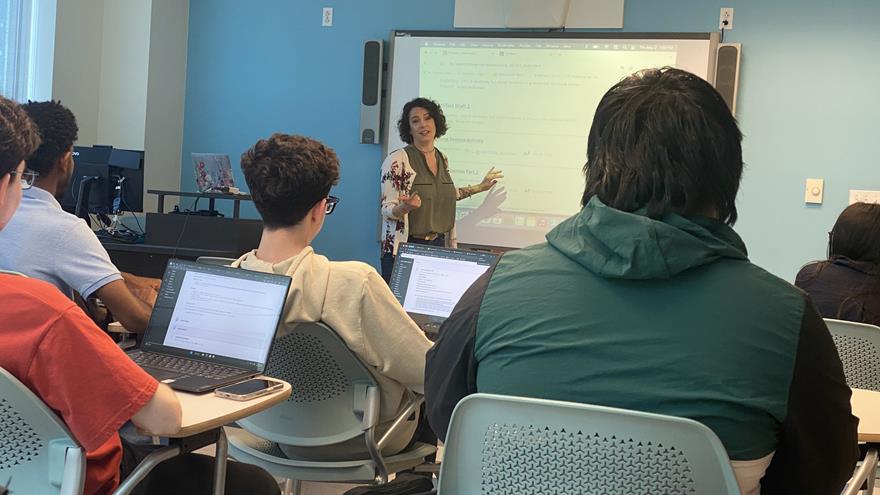Meet Lisa DiMaio, Recipient of the Inaugural Provost Award for Undergraduate Teaching Impact
By Natalie Kostelni

On the first day of her courses teaching multilingual students in the First-Year Writing Program, Lisa DiMaio, EdD, hands out notecards for each student to share some background information on themselves including their native language and country, hobbies, and whether they have any food allergies.
“I love to bake,” DiMaio said.
Students love her classes and her baking, whether it’s cupcakes sprinkled with the colors of their country’s flag or ugly sweater cookies brought in during December.
“I want them to feel at home,” DiMaio said. “Their families are thousands of miles away and I want my classroom to be a home away from home for the students. By creating a warm and stress-free environment, we create an atmosphere where students feel comfortable, and if they feel comfortable and not anxious, they are more willing to take risks, collaborate and learn.”
This approach is an extension to her teaching philosophy to create a student-centered, interactive classroom filled with collaboration, conversation, and social interaction. Students lead class conversations with DiMaio serving as facilitator.
DiMaio is among four Drexel faculty recognized for implementing outstanding innovations in teaching and learning with the inaugural Provost Award for Undergraduate Teaching Impact in 2023. This award recognizes full-time faculty who have made a distinctive impact through excellence in teaching primarily at the first- or second-year undergraduate level.
DiMaio employs the methodologies of Sociocultural Theory (SCT) during classes. This teaching approach supports a process in which development and learning take place through social interactions. Research has found it is a particularly effective learning environment for individuals from different cultures.
Students indicate in course evaluations and testimonies that her classes have positively impacted their learning and, for some, their lives.

Lisa DiMadio, EdD, with her class.
One student wrote in a course evaluation that Dr. DiMaio “has created an environment in which non-native speakers of English like me feel comfortable to talk and debate with one another. I really appreciate this! The flexibility and the meaningful interactions between peers are both extremely beneficial.”
While the classroom is an important environment to cultivate conversations and social interactions, DiMaio also meets with students one-on-one to discuss written feedback she provides on the draft essays they hand in and gives them an opportunity to address any concerns they may have.
In this interview, DiMaio discusses how her teaching philosophy has evolved, the different roles she has held at Drexel, and what advice she would give someone new to teaching multilingual students.
What drew you to teaching?
When I started college, I knew I wanted to be an English teacher and thought about being a bilingual teacher. I finally realized I wanted to teach multilingual students focusing on student writing. They always have a story to tell and sometimes those stories go unheard.
Do you speak another language?
English is my first language. I studied Spanish for six years and was fluent while an undergraduate and continue to study the language.
What are some of the roles you have held during your career at Drexel?
I started my teaching career in the English Language Center in 1997. Three years later, I was hired by the Department of English and Philosophy to coordinate the writing program for multilingual learners (ML) and teach composition courses in the First-year Writing Program (FWP). By 2015, in addition to my teaching responsibilities, I was appointed Faculty Writing Fellow by Dr. Scott Warnock, former director of the University Writing Program (UWP). After a recent restructuring of the UWP, my title changed to Coordinator of Multilingual Learner Writing Resources. Although I perform a variety of tasks for the UWP, most of my work is dedicated to teaching undergraduate multilingual students.
Where are your students from and the languages they speak?
All over. I have Spanish speaking students from Spain, Ecuador and Peru. I have students from Kazakhstan who speak Russian and Kazak. I have many students from India and many students who speak Chinese and Vietnamese. Some of my students know and speak four languages. Each student has their own voice, and they bring a myriad of experiences as world travelers. It’s as if in class each student serves as a piece of our quilt — they are pieces of the whole.
How has your teaching philosophy evolved?
While creating a nurturing environment for my students has always been part of my philosophy, it has evolved in that I aim to help students succeed no matter where they are. Universal Design for Learning is also part of my philosophy and I believe all students can learn if you give them multiple opportunities to succeed.
What are some of the topics you cover in class and why?
We cover so many challenging issues including racism, equality and oppression, and I ask them to share any personal experiences related to the topics we discuss in class. They also come to class with fantastic experiences and background knowledge, but it may not be baseball, the World Series or Super Bowl, so we get into some of those Philadelphia-related topics as well. It’s important that they learn about a range of topics so they can understand them and their nuances when they are reading literature or writing.
What advice would you give to someone new to teaching multilingual students?
When they go into a class of multilingual writers, whatever differences they might see or hear, I hope they will value the students’ differences and look at those merely as differences and not deficiencies in their writing, written accent or spoken word. When we strip their accent, we strip away their voice and identity. It doesn’t mean their writing is bad or not good enough. What is good writing? Is it communicating the meaning of powerful idea or accurate grammar?